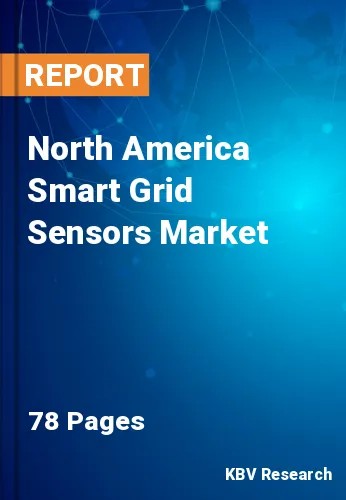The North America Smart Grid Sensors Market would witness market growth of 15.3% CAGR during the forecast period (2022-2028).
In the transmission industry, digital investment is focused on the digitalization of power transformers, automation of substations, and the development of advanced sensors (such as phasor measurement units) and flexible alternating-current transmission systems (FACTS), enabling a faster and more flexible operation as well as better control, monitoring, and optimization of the power grid. Lastly, investment in infrastructure for public electric car charging will increase by more than 20% in 2021. However, it still accounts for less than 5% of the distribution investment.
In general, smart grids give customers greater power by giving them more control over how they use energy and how much it costs. For example, users can pay according to their usage rather than a fixed fee. Also, end users who employ renewable energy sources like solar panels on their rooftops can sell any extra energy generated on their land. Because of this new infrastructure, the power generation, delivery, and storage trend are shifting towards more decentralization.
The U.S. electric grid, which has more than 9,200 electric generating units with a combined producing capacity of more than 1 million megawatts and more than 600,000 miles of transmission lines, is an engineering wonder. Therefore, the Office of Electricity (OE) is collaborating with its public and corporate partners to strengthen, develop, and enhance the energy infrastructure to assure access to dependable, secure, and sustainable energy sources. The frequency and duration of power outages can be greatly reduced, as can the impact of storms, by modernizing the grid to make it "smarter" and more resilient by using advanced technologies, apparatus, and controls that communicate and cooperate to deliver electricity more reliably and efficiently. These Factors are drive the development of the North American smart grid sensor market.
The US market dominated the North America Smart Grid Sensors Market by Country in 2021, and would continue to be a dominant market till 2028; thereby, achieving a market value of $184.9 Million by 2028. The Canada market is poised to grow at a CAGR of 18% during (2022 - 2028). Additionally, The Mexico market would witness a CAGR of 16.9% during (2022 - 2028).
Based on Application, the market is segmented into Smart Energy Meter, Advanced Metering Infrastructure, Smart Grid Distribution Management, Supervisory Control & Data Acquisition and Others. Based on Type, the market is segmented into Voltage & Temperature Sensors, Outage Detection and Others. Based on countries, the market is segmented into U.S., Mexico, Canada, and Rest of North America.
Free Valuable Insights: The Global Smart Grid Sensors Market is Estimated to reach $913.8 Million by 2028, at a CAGR of 15.8%
The market research report covers the analysis of key stake holders of the market. Key companies profiled in the report include General Electric Company (GE Grid Solutions), Siemens Energy AG, ABB Group, Renesas Electronics Corporation (Echelon Industries Corporation), Aclara Technologies LLC. (Hubbell Incorporated), Landis+Gyr Group AG, Itron, Inc., S&C Electric Company, Trilliant Holdings, Inc., and Sentient Energy, Inc. (Koch Engineered Solutions) (Koch Industries, Inc.)
By Application
By Type
By Country
Our team of dedicated experts can provide you with attractive expansion opportunities for your business.

